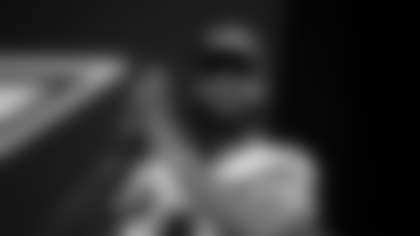This story originally appeared in Dallas Cowboys Star Magazine. For subscription information, please click here.
Somewhere in Houston there are two headstones of meaning for Lawrence Vickers. One marks the grave of his father, Lawrence Vickers Sr., who died unexpectedly earlier this year. The other identifies the resting place of a man who had just as valuable an impact on Vickers in his younger life. He won't give you his name, but during his formative years in the Fifth Ward, Vickers says that both men made sure he had every chance to get out of one of Houston's toughest neighborhoods.
"My friend, (his death) was a turning point," Vickers says. "My father, that's like losing the ultimate loved one."
As Vickers plays his seventh NFL season, and his first in Dallas, he will have both men on his mind.
His father was a huge Cowboys fan, even though he lived in Houston his entire life. Vickers jokes that while his dad followed the Cowboys, he grew up a Houston Oilers fan and loved the old "Run and Shoot" offenses of Hall of Fame quarterback Warren Moon and head coach Jack Pardee.
Vickers says that as much as his father and mother, Peggy Sue Warren, loved having him back in Houston last year playing for the Texans, his father was absolutely thrilled with the prospect of seeing his son play for his favorite team in Cowboys Stadium this fall.
But he didn't get the chance. Shortly after Vickers signed his contract with the Cowboys and began working out with the team, he received a phone call from his family. His father's health had taken an unexpected turn for the worse. The lung cancer that Vickers thought his father had defeated came back with a vengeance.
The call came on a Sunday. Vickers Sr. died the following Friday.
"It was sudden," Vickers says. "He wasn't supposed to die. When it came, it just took him in a matter of days. Right before he passed he told me that he couldn't wait to see my first game (in Dallas)."
Getting to the NFL and getting out of the Fifth Ward was the culmination of Vickers Sr.'s desire to make sure his son had a better life than his own.
At one time, the Fifth Ward was considered one of Houston's best neighborhoods. Created as a political district in 1866, the area is northeast of the city's downtown and although a fire tore through the ward in 1912, there are buildings, including five churches, which have stood for more than 100 years.
Heavyweight boxing champion George Foreman grew up there. So did former U.S. Congresswoman Barbara Jordan and current Los Angeles Dodgers outfielder Carl Crawford. The neighborhood was a nexus for jazz musicians in the mid-20th century, including Illinois Jacquet, Milton Larkin and Arnett Cobb.
As Vickers was growing up, more than 60 percent of the 22,000 residents of the Fifth Ward were unemployed, according to the 2000 U.S. Census and the City of Houston's Department of Health and Human Services. Nearly 50 percent lived at or below the poverty level. More than half had never graduated high school and just six percent had graduated college. Plus, the neighborhood had a violent crime rate that was three times higher than the Houston average overall.
It was, to say the least, a difficult neighborhood in which to grow up. Texas Monthly once described it as "Texas' toughest, proudest, baddest ghetto."
Things have gotten better in recent years, as the Fifth Ward Community Redevelopment Corporation has helped push through construction, job training and artistic projects designed to highlight the area's heritage, according to the Texas State Historical Association.
As an important reminder of his roots, Vickers has a large tattoo on his back that says "Fifth Ward."
Early in his childhood, he says his mother made the decision to send him to live with his father, a decision that would have a profound impact on his upbringing.
"You don't get a lot of kids who get to live with their fathers, especially in my neighborhood," Vickers says. "Most people went home to their mom. I just went home to my dad."
Vickers Sr. was an athletic youngster, but his education ended in the eighth grade, according to his son. Vickers Sr. had to get a job to help support his family. He never went to college. In fact, he didn't get what Vickers calls his first "real job" until he was 40, working to clean chemicals out of ships in the Port of Houston.
But his father was what Vickers calls "a clever dude."
"He didn't have book smarts, but he had all the common sense in the world," Vickers says. "He taught himself. He had an eighth-grade education, but with all of his brothers and his sisters, and his mama, he had to help them out. Then he raised seven kids."
Because he wasn't able to finish school, Vickers Sr. made sure his middle son did. Vickers ended his high school career on the A-B honor roll. Just as importantly, he fulfilled the athletic promise that Vickers Sr. had once hoped for himself. Vickers finished his career at Houston's Forest Brook High School with 4,610 rushing yards and 70 touchdowns, totals that drew plenty of attention from college recruiters. Vickers was also athletic enough to average a double-double (20 points, 10 rebounds) for the Forest Brook basketball team his senior year.
But Vickers Sr. made sure that his son's childhood wasn't all about athletics.
"I did everything, anything you could name: dance, ballet, breakdancing, poetry, literature, Boy Scouts, football, baseball, basketball, everything," Vickers says. "My dad put me in everything possible growing up. He wanted me to see all of my talents and to grow up and be a well-rounded person.
"When you have a person like that, that you love, he's a part of your life every day. When I wake up each morning and say my prayers, I think of him. I ask him how I did each day when I come off the practice field. I admire my father. He's my hero. I've never looked up to anyone else. My dad was the realest person I've ever met in my life."
The nameless man who helped influence Vickers growing up was an older gentleman who Vickers says took an interest in young people doing good things in the Fifth Ward. The two became friends and the man ended up coming to all of Vickers' high school football games and other events, and even went to games during his first season at Colorado.
Vickers calls him a "Robin Hood."
"If you were a young guy in my neighborhood who was doing positive stuff, he'd look after you and make sure you were in school," Vickers says.
Unfortunately, after his first year at Colorado, Vickers' friend died. He wouldn't talk about the how, only saying that the loss fell in the category of "bad things happening to good people."
His death had a profound impact on Vickers, so much so that after wearing No. 34 at Colorado his freshman year, he switched to No. 17 for his sophomore season. His fallen friend was the reason he made the change.
"After he died, I dedicated myself to taking all of the bad out of my life," Vickers says. "Thirty-four was part of the old and I was going to chop all of the bad out of my life, and that was half of the stuff that I had at the time. So that made (my number) 17. Seventeen plus 17 is 34. You have different things in your life that happen that make you think about things. So when that happened I thought, 'It's time to get rid of all of the bad things in my life' and I've never looked back since. That's why I keep a seven in everything I do.
"Anything you could think of that wasn't helping me, people, things, situations, whatever you could think of that could come at a kid when he's in college in the bad sense, I let it go. Just cold turkey. I let it go. It wasn't hard. I had motivation."
The influence of these two men altered Vickers' approach to both his family life and his football career. He has his own children now and says the best possible compliment you could pay him is that he's raising his kids as his father raised him. His father's influence, and his friend's support, allowed him to become one of the first members of his family to go to college, graduate from Colorado in three and a half years and fulfill Vickers Sr.'s goal of his son getting out of the Fifth Ward.
"I'm raising my kids how my dad raised me," Vickers says. "I have to. I turned out pretty good. I was one of the first in my family to make it out of my neighborhood. All on the strength of one man. I had a lot of people help me along the way, but my dad was the center of it all for me. I am him. That's why I'm junior. I am the best reflection of him that you'll ever get. He told me I was the good version of him."
In football, Vickers has devoted himself to making others look good.
"Anything they need from me," Vickers says. "I'm just a whatever-you-need type of guy, a pure fullback, a versatile back, a motivator, whatever. I'm all about the team. Team is first with me."
Drafted in the sixth round in 2006 by Cleveland, Vickers spent a year behind Terrelle Smith before taking over as the starting fullback in 2007. He opened up holes for former All-Pro Jamal Lewis that season, as Lewis rushed for 1,304 yards and nine touchdowns. Vickers then helped Lewis to another 1,000-yard season in 2008.
The Browns transitioned from Lewis to Jerome Harrison in 2009, and with Vickers leading the way, Harrison had an explosive second half of the season, rushing for 862 yards after taking over as the full-time starter. Lewis added 500 yards before an injury ended his season and career.
Peyton Hillis' explosive 2010 campaign can be partly attributed to Vickers, who again started at fullback. Hillis took over the starting job shortly after the start of the season and rushed for 1,177 yards and 11 touchdowns.
But the end of 2011 meant the end of Vickers' contract with Cleveland. With his value as a fullback established, his hometown Houston Texans signed him to a deal for the 2011 season to block for Arian Foster, who was coming off an All-Pro effort. The Texans also had 2010 first-round pick Ben Tate, and Vickers helped both dominate. Foster rushed for 1,224 yards and 10 touchdowns, while Tate gained 942 yards and scored four times. Foster earned another Pro Bowl berth.
"When you have a veteran in front of you (like Vickers) there isn't much he hasn't seen," Foster said last year. "He knows how to practice and that's what separates good players from great players."
Salary cap concerns led the Texans to release Vickers on March 13, but after clearing the path for three 1,000-yard rushers in five seasons, Vickers had plenty of suitors, with Dallas the eventual winner of his services.
Turns out the Cowboys had interest in Vickers when he left Cleveland after the 2010 season. Running backs coach Skip Peete loved the signing of Vickers to a two-year deal, saying that the Cowboys wanted him sooner, but the compressed free-agency period after the NFL lockout last year didn't allow the team much of a chance to court him.
"He's a very energetic, outgoing kid," Peete says. "I really enjoyed watching him on film the last couple of years. The last year in Cleveland he became available and we actually made a push for him and he signed in Houston. We followed him last season and when he became available this season, we kind of made it a priority to get him. He's a physical, lead blocking fullback that I think if you want to be a power running team, you need to have a guy like that."
Starting running back DeMarco Murray agrees, especially since he is the rusher who will now benefit the most from Vickers as a lead blocker.
"We've jelled real well together," Murray says. "He's a great blocker. Very, very smart."
As Vickers plays for the Cowboys this season, he wears No. 47 – a nod to his desire to keep his life in sevens – and carries the influence of his father and that nameless supporter onto the field.
But if you think he'll be devoid of family in the stands this season, think again. His mother will be there. Vickers can promise you that much.
"My mom is my biggest supporter," Vickers says. "My mom was at every game. I'll tell you right now, for people that go to a Cowboys game this year, you're going to know who she is. I guarantee you'll know which one she is. You'll see. I wouldn't be surprised if they flashed a camera on her.
"My mom is the love of my life. I'm just a daddy's boy."















